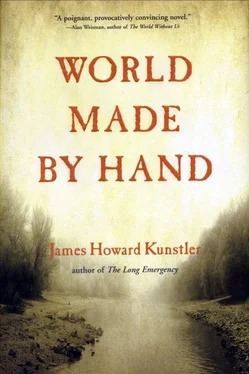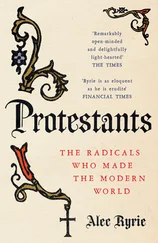Since then, several farmers around the county had taken up cultivating opium poppies, a venture promoted by Dr. Copeland, who made his own laudanum, tincture of opium, for use in surgery and other medical emergencies, since it was no longer possible to get advanced pharmaceutical painkillers. He also made a kind of sedative tea from boiling the seedpods. Lately he’d been working on a procedure for refining morphine. People wanted him to be well supplied. He made sure, in turn, that our dentist, Larry Prager, had plenty. Nobody had dared burgle Jerry Copeland’s lab for laudanum out of fear that someday they might be lying on a stretcher with a compound fracture of the femur in need of a potent analgesic.
We regarded opium as a godsend. It did not develop into an illicit trade, though. There was no legal prohibition, no police running around trying to suppress drugs, driving up the price artificially, and no marketing system. There were no distant markets to send it to because shipping anything was slow at best and often unreliable, and travel was something you just didn’t do anymore. Anybody could grow their own poppies or buy raw opium paste from one of the growers. Farmers made more money growing raspberries or asparagus. They grew poppies as a public service. A few people took to smoking opium, but those with an extremely apathetic attitude toward survival tended not to last long in the new disposition of things.
So, Wayne Karp turned the focus of his energies to running the general supply. He had a large crew out there systematically digging up the old landfill and sorting out valuables, especially glass, plastic containers, pipes, hinges, screws and nails, anything that could be reused. He sent other crews around the countryside to disassemble abandoned houses for their materials. Back in the glory days of the suburban expansion, many split-level houses had been built on roadside out-parcels far away from the towns, the stores, and the jobs. The people who built them expected to be able to drive cars everywhere to work and meet their daily needs forever. Now, with the population so far down, and many empty houses in town itself, and the oil gone, and no ability to drive heroic distances, these buildings had no value except for salvage.
To get to the general supply, you had to go past the old high school at the edge of town on North Road. I was interested to see suddenly quite a bustle about the place. Several wagons stood before the main entrance, and men were off-loading things: furniture, trunks, crates, a big iron wood-fired cookstove with shiny chrome appointments. Another gang worked up on the roof. You could smell tar boiling from where I stood. Yet another crew was out in what used to be the parking lot, breaking up the asphalt with picks to feed the tar-boiling operation. In this weather, it must have been brutal work. A column of white smoke curled up in the breezeless air.
The old high school football field was in the process of being turned into a large garden. It had been returning to scrub in recent years anyway. The newcomers had done an impressive job of clearing the sumacs and other weedy trash. They had already plowed up the field and harrowed and raked it smooth. A dozen women were out there now in long skirts and straw hats, stooped over and inching their way up new rows planting seeds. It was a little late to be starting most vegetables. I hoped they knew what they were doing.
I paused on the road there watching at a distance for a while, fascinated by the scale of enterprise and wondering how it was organized. In my old corporate days, I was considered a good organizer. That’s what my job was mainly about, getting things done on time, pulling things together. I had a fascination with how people managed other people in the corporate world. In our world now, the freehold farmer was the new chief executive. The authority in town was a lot less clear-cut, to put it mildly, with the popula tion so diminished and no money to do anything and schooling reduced to the little church-affiliated academy that Jane Ann was in charge of. We musicians in the First Congregational submitted to the direction of Andrew Pendergast who ran the choir, the music circle, and the spin-off chamber ensemble. And of course the Reverend Loren Holder was in charge of the church itself, and most of the activities organized within it. It was not always so easy to understand or accept the authority of the God that our church was organized to honor, given all the hardships he had brought down upon us.
The people working over at the high school ignored me as I stood watching them from the road. There wasn’t any sign of Brother Jobe, but I supposed that all this activity was directed by him. I certainly wondered how these newcomers were going to fit into the life of our town. It was obvious that the balance of things was going to change with them around. I reflected on the possibility that it might be for the better, since at least they would set an example of cooperative labor, something we had gotten sloppy about, especially where the upkeep of the village was concerned. There would also be new blood in town, people with new skills, maybe some good musicians among them, perhaps even an eligible woman-but this led me into a rueful consideration of my relations with Jane Ann, which was something I could hardly bear to think about. I supposed that this outfit was a covenanted sect and you’d probably have to sign on with them to meet a woman, and no doubt they had a lot of special rules of behavior, and for all I knew maybe they followed celibacy like the old Shakers had. I did not see any children anywhere.
The old high school complex itself was a 1970s-vintage modernist monstrosity, a U-shaped set of low-slung rectilinear boxes like ten thousand other schools around the nation from the period. Seeing the building usually made me deeply sad and even a little angry, the way that refrigerator in my garden did. Its vision of yesterday’s tomorrow seemed pitiful. Children like my Daniel and Genna had sat in those very box buildings under buzzing fluorescent lights listening to their science teachers prattle about the wonders of space travel and gene splicing and how we were all going to live to be a hundred and twenty five years old in “smart” computer-controlled houses where all we had to do was speak to bump up the heat or turn on the giant home theater screens in a life of perpetual leisure and comfort. It made me sick to think about it. Not because there’s something necessarily wrong with leisure or comfort, but because that’s where our aspirations ended. And in the face of what had actually happened to us, it seemed obscenely stupid. Thinking about all that got me so agitated, I took off up the road. Motion is a great tranquilizer.
Halfway out to the general supply I ran into Shawn Watling, a big, shambling young man who so typified our times. He’d been born in a hospital and raised on computers, and then all of a sudden the world fell out from under him. I met him coming onto North Road where Black Creek Road joins up with it. There is a bridge there over the creek, which is a tributary of the Battenkill. Shawn worked as one of several hands on the Schmidt farm up the hill, which was in fruit, oats, buckwheat, and hay, with some beef cattle, and goats for milk and meat. Agriculture had changed completely without oil. We’d gone from a few people using machines to grow monoculture crops and process them for everybody else, to a society in which at least half the people used tools skillfully with human and animal muscle to feed the other half. With the population down so much, labor was at a premium. Shawn was probably paid decently, but his opportunities were limited.
His father, Denny Watling, had run a real estate office in town. His mother, Margie, was the leading sales agent. Shawn’s parents played in a country music band all tricked out in matching cowboy outfits at local bars and the county fair every August. They were regular small-town folk who read spy novels, got new cars every three years, and once took a vacation to see Paris. They were gone now, along with Shawn’s little brother, Cody, who had been my boy’s age, taken by the flu. Shawn inherited his father’s instruments (violin, mandolin, guitar) and was part of our music circle in church. He was a hell of a musician. He was in the last graduating class that Union Grove high school ever produced and he spent one semester at Colgate University before it, and most colleges everywhere as far as I knew, had to close on a temporary basis that now seemed permanent. Shawn went to work for Bill Schmidt because that was what there was to do for a young person like him. He was strong in a way that you hardly ever saw in the old days, strong from real work, not from lifting barbells or aerobics classes. At age twenty-three, he married another young survivor, Britney Blieveldt, and they had a girl named Sarah. Shawn was not a kid anymore. He and his family lived in town in his parents’ old house, which was one of the nicest ones on Salem Street, our nicest street. Having a nice house didn’t make him wealthy or boost his status, though. There were plenty of empty houses in town and no one to sell them to. The real estate industry no longer existed.
Читать дальше












